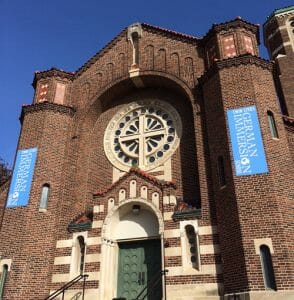After two-and-a-half days of hearings this week – and a site visit – it’s up to Ramsey County District Judge Jennifer L. Frisch to decide whether or not to block – temporarily or permanently – demolition of the former St. Andrew’s church building.
Twin Cities German Immersion School officials told the court they expect to have permits in hand that would allow demolitionas soon as July 15. Frisch says she intends to issue a decision before then.
Meanwhile, both sides will have a mediated discussion with retired Judge John B. Van De North on July 10-11.
Preservationists are seeking injunctions that would prevent the school
from tearing down the former church at 1031 Como Ave. The school intends
to replace it with a building addition to add classrooms and other
academic space; a full cafeteria; and a gymnasium to serve the school’s
growing enrollment.
What’s a ‘resource’? What’s ‘feasible and prudent’?
The preservationists – Friends of Warrendale-Save Historic St. Andrew’s
LLC – are staking their case on the Minnesota Environmental Rights Act,
which prevents “impairment” or “destruction” of “natural resources.”
Under the Act, “natural resources” includes “historical resources.”
In the court hearing, architects, architectural historians, and developers testified about the architectural and historic significance of the former church building. Some identified alternatives or alternative approaches that would preserve the building and still allow the school to meet at least some of the additional space requirements it says it needs.
Representatives of the school say they did explore alternatives, including renovating the former church and building a separate gym; acquiring nearby property to help make that happen; splitting the school into two campuses; or purchasing property elsewhere, selling its current property, and moving. All these possibilities, they said, were less desirable – or even impossible – for financial, logistical, educational, or other reasons. School representatives also said litigation has put construction a month behind schedule; they argued further delays could raise costs now and far into the future.
Under the state law, the school must prove that it has no “feasible and
prudent alternative” to demolition. However, “economic considerations
alone” are not a good enough reason.
School plans construction ahead of financing
The preservationists were unsuccessful in persuading the Saint Paul
City Council to grant the former church local historic designation. That
cleared the way – barring district court intervention – for the school
to seek demolition and construction permits from the city.
The school says it intends to tear down the church structure and begin pouring footings and a foundation as soon as it obtains permits. School representatives told the court this timetable is necessary for two reasons: so demolition is finished before school resumes in August, and so construction is as far along as possible before winter.
The school’s timetable also means demolition and construction would begin before the school has its financing in place. The school expects to finance its project using conduit revenue bonds from the city’s Housing and Redevelopment Authority. This is a common way that charter schools pay for construction projects. A preliminary hearing on the school’s bond request is scheduled for July 24. HRA is scheduled to vote on the bonds Aug. 14. School representatives then would sell the $17 million in bonds on the private market, with a target “closing” date of Sept. 5.
Attorneys from Faegre Baker Daniels argued the preservationists’ case. Attorneys from Robins Kaplan argued the school’s case.

